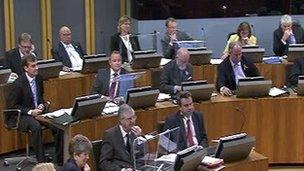Organ donation opt-out system given go-ahead in Wales
- Published
- comments

The Welsh assembly debated a series of amendments to the Bill
A change in the law to bring in an opt-out organ donation system has been overwhelmingly voted through by Welsh assembly members.
Wales will become the first UK country to adopt a process where individuals will be presumed to have consented for their organs to be donated unless they opt out.
Ministers want to increase the number of donors for transplant.
The new presumed consent system could come into force by 2015.
Some 43 of the 60 assembly members backed the bill, eight voted against and there were two abstentions.
Welsh Health Minister Mark Drakeford said it was "an historic day for Wales" which had "demonstrated the huge strengths of this assembly".
"Wales is a progressive nation and this is a progressive policy for that progressive nation," he said.
Welsh Liberal Democrat Leader Kirsty Williams said she hoped the Bill would mean more people would benefit from organ donation, "that most altruistic of gifts".
Plaid Cymru AM Rhodri Glyn Thomas said the discussion and the process which had led to the final vote had showed the assembly was "capable of creating good law here".
But Conservative AM Darren Millar, shadow minister for health, insisted there was "still much work to do".
"The coming months and years must now be spent intensively educating families and communities the length and breadth of Wales," he added.
"This is a significant change from the previous system that remains controversial - and no stone must be left unturned in getting the message across."
There had been opposition to the changes from Christian churches and from within the Muslim and Jewish communities.
They wanted a so-called "soft opt-out scheme" in the legislation to give deceased patients' families a say on donation if their relative had neither opted in or out.
But the Welsh government hopes the legislation will lead to a rise in the number of donors by around 25%.
Dr Richard Lewis, Welsh Secretary of the British Medical Association (BMA), said the assembly had shown "the rest of the UK the way forward" with the legislation, adding: "Patients across the country will now benefit directly or indirectly benefit from this Bill."
Roy J. Thomas, chief executive of Kidney Wales Foundation, said: "The new law gives hope for all those waiting for a transplant in Wales and will gladden the hearts of those in the UK who see this as a sign that other parts of the UK may follow this vote."
Waiting list
Assembly members debated the issue before voting on the opt-out system late on Tuesday evening.
Speaking before the vote, Mr Millar called for an independent evaluation of the new system to be carried out once it was up and running, as it was possible there could be "unintended consequences" from presumed consent.
He warned that evidence from Chile, since it had introduced such a system, showed that it could result in a fall in the number of organ donors.
Mr Drakeford assured AMs that the Welsh government had already committed to reviewing the new system five years after it became law.
As currently happens, organs could go to recipients anywhere in the UK, not just in Wales.
However evidence from other countries with an opt-out system indicates that the rise is small with around 15 additional donors provided each year and approximately 45 extra organs.
Martyn Griffiths: "There are days when I get fed up and don't want to go to dialysis"
According to the NHS Blood and Transplant service, fewer than 5,000 people die every year in the UK in circumstances that would allow them to donate successfully.
Added to that, when compatibility, organ suitability, location, time scales and consent are taken into account it means that not everyone who wants to donate actually does.
It is estimated there are around 250 people on a waiting list for a transplant at any one time - 33 people in Wales died in 2012/13 while waiting.
The 30-strong Labour group in the assembly was whipped to vote in favour of the Bill. Conservative and Plaid Cymru AMs had a free vote.
The Lib Dems said all five of their AMs were in favour of presumed consent.
- Published1 July 2013
- Published2 July 2013
- Published2 July 2013
- Published2 July 2013
- Published2 July 2013
- Published16 April 2013
- Published11 April 2013
- Published25 March 2013
- Published18 February 2013